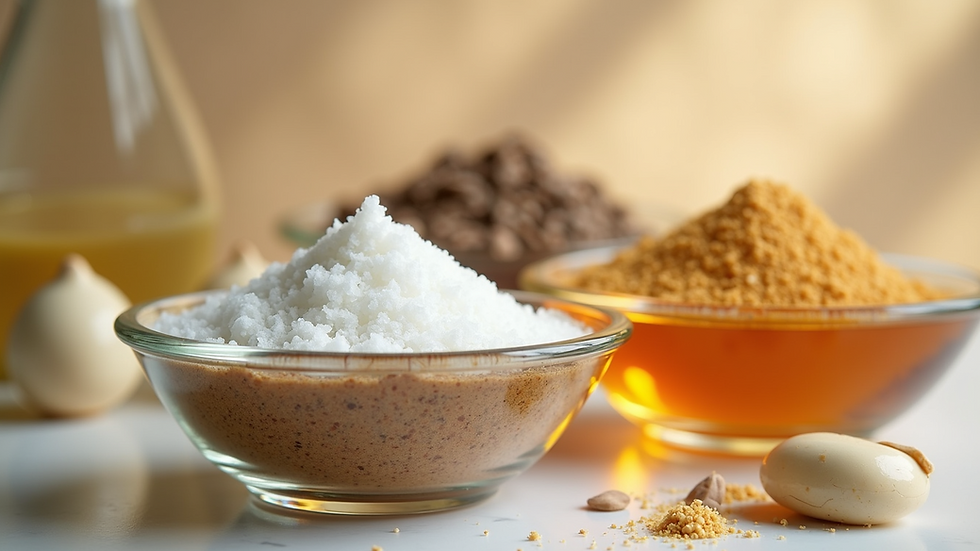Tips for Calming and Caring for Sensitive Skin
- Lidia Vazquez
- Jun 11, 2025
- 4 min read
Sensitive skin can be a challenging condition to deal with. From redness and irritation to dryness and discomfort, those with sensitive skin often struggle to find products that work for them without causing further issues. However, with the right tips and care routines, it is possible to manage and soothe sensitive skin effectively. This guide provides essential information and practical advice on how to calm and care for your sensitive skin.
Understanding Sensitive Skin Care
Sensitive skin is characterized by its reaction to environmental factors, ingredients in skincare, and various products. A staggering 50% of the population experiences sensitive skin at some point in their lives, often leading to discomfort and frustration. The causes of sensitive skin can include genetic predisposition, environmental conditions, and even lifestyle choices. Understanding this will help you choose the right products and routines that can alleviate discomfort while protecting your skin.

Recognizing Irritants and Triggers
One of the first steps in managing sensitive skin is identifying irritants and triggers. These can vary from person to person, but common culprits include:
Harsh ingredients: Many commercial skincare products contain alcohol, fragrances, and strong preservatives that can irritate sensitive skin.
Environmental factors: Weather conditions such as extreme heat or cold can exacerbate skin reactions. Pollution can also contribute to skin sensitivity.
Dietary choices: Some foods can trigger skin reactions. Common allergens like dairy, nuts, or gluten may affect your skin adversely.
Keeping a diary of your skin’s reactions can help you track what products or environments may be causing issues. This will allow you to unpack your skincare routine step by step.

Choosing the Right Skincare Products
When it comes to sensitive skin care, selecting the correct products is crucial. Here are a few tips:
Opt for Fragrance-Free Products: Products that contain fragrances are known to irritate sensitive skin. Look for options labeled as hypoallergenic or formulated for sensitive skin.
Check for Minimal Ingredients: The fewer ingredients a product contains, the lower the likelihood of a reaction. Look for skincare products with simple formulations, ideally containing natural components.
Test Before You Commit: Always perform a patch test with a new product. Apply a small amount on your wrist or behind your ear and wait for 24 hours to see if any irritation occurs.
Focus on Hydration: Moisturizers with hydrating ingredients like hyaluronic acid, glycerin, or ceramides can help lock in moisture, preventing dryness and irritation.
Consider Natural Remedies: Natural ingredients such as aloe vera, chamomile, and calendula are known for their calming properties and can be beneficial for sensitive skin.
Incorporating these strategies will not only help you find suitable products but may also reduce the likelihood of flare-ups.
Developing a Gentle Skincare Routine
Creating a gentle skincare routine is essential for those with sensitive skin. Here’s a helpful daily routine to consider:
Morning Routine:
Gentle Cleanser: Start your day with a mild, hydrating cleanser free from sulfates. Look for cream-based cleansers that do not strip away your skin's natural oils.
Toner: If you choose to use a toner, ensure it is alcohol-free and contains soothing ingredients like rose water or green tea extract.
Moisturizer: After cleansing, apply a gentle, hydrating moisturizer to lock in moisture.
Sunscreen: Never skip sunscreen. Opt for a mineral-based sunscreen containing zinc oxide or titanium dioxide, as they sit on the skin and reflect ultraviolet rays.
Evening Routine:
Cleanser: Cleanse your face again with the gentle cleanser to remove makeup and impurities.
Serum or Treatment: If needed, choose a calming serum that targets your skin concerns without harsh chemicals.
Moisturizer: Finish with a nourishing night cream that helps repair the skin barrier as you sleep.
Following this simple, yet effective routine can significantly reduce sensitivity and improve your skin's overall health.
Lifestyle Practices for Sensitive Skin
Skincare routines are only one part of caring for sensitive skin. Lifestyle changes can also make a significant impact:
Stay Hydrated: Drinking enough water helps keep your skin hydrated from within, which is essential for sensitive skin.
Manage Stress: Stress can exacerbate skin conditions. Consider incorporating mindfulness practices such as yoga or meditation into your daily routine.
Eat a Balanced Diet: A diet rich in fruits, vegetables, and healthy fats can improve your skin's condition. Omega-3 fatty acids, found in fish and flaxseed, are particularly beneficial.
Maintain a Consistent Sleep Schedule: Lack of sleep can lead to increased skin sensitivity. Aim for 7-9 hours of quality sleep each night.
These lifestyle factors contribute greatly to the health and resilience of your skin.
Seeking Professional Help
If you continue to struggle with sensitive skin despite trying various products and routines, it may be time to consult with a dermatologist. They can provide tailored recommendations based on your specific skin type and concerns. Sometimes, underlying conditions like eczema or rosacea may require targeted treatments.
Furthermore, they can help determine if you need a more comprehensive skincare regimen, which may include medicated products.

Taking the time to understand and care for your sensitive skin can lead to healthier and more radiant skin. Implement these tips, monitor your skin’s reactions, and remember—patience is key. Beautiful skin takes time to cultivate, so be gentle with your process. If you are seeking gentle skincare for sensitive skin, explore products specifically designed to nourish and protect delicate skin types, such as those from LV Beauty Natural.




Comments